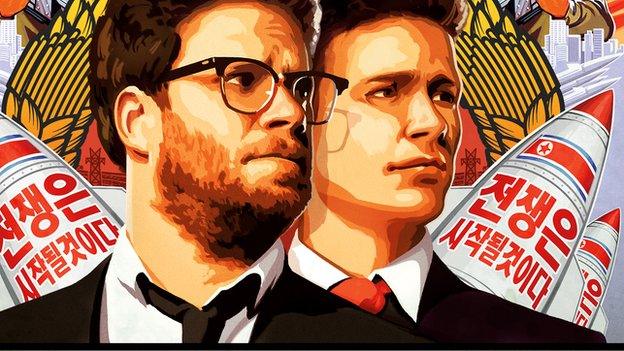The Interview: A Hollywood romp with political punch
- Published
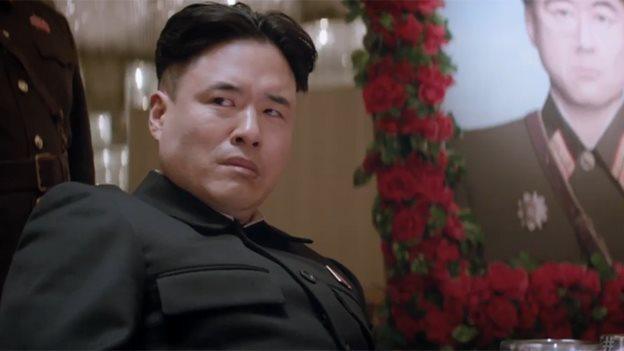
The fictional Kim Jong-un indulges in threats and floods of tears
The limited Christmas release of The Interview has given viewers a chance to assess The Interview first hand. Could a Hollywood satire really undermine the North Korean leader?
The Interview is a classic Hollywood romp involving two lads who go to a strange place and get seduced (in several senses). They engage in an unlikely caper of blood and humour. It has lots of shots of women's cleavages and jokes about bottoms.
And it is, to this viewer, very funny. That's partly because it is also a very good political satire. It is a cut above most classic holiday Hollywood romps in that it is, as the Washington Post observed, "politically astute".
It is powerful because it depicts Kim Jong-un as a flawed human who is sentimental and ruthless.
He is a vain, buffoonish despot, the film suggests, alternating between threats and floods of tears as he weeps that he's been misunderstood - the son complaining about the expectations of the father.
He has deadly tantrums, particularly when asked why his regime is spending untold millions on developing atomic weapons at the same time as it is receiving UN food aid. The people around him have all the signs of fear you might expect with a despot - they second-guess his likes and dislikes.
Maybe he - and they - were right to fear the film. What may threaten despots is ridicule (it's what Charlie Chaplin understood - or at least, hoped - when he made The Great Dictator about Hitler).
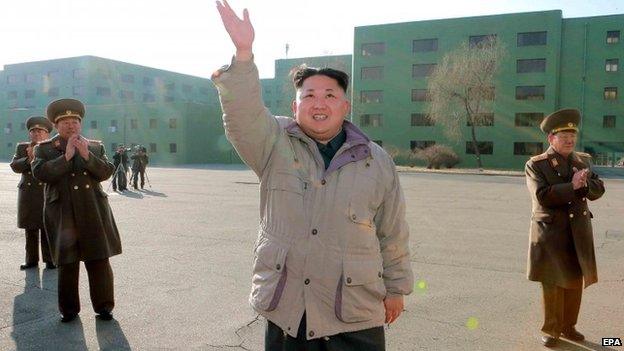
The fear of Kim Jong-un being undermined could well explain the regime's harsh response
When the people think the hard man's a joke, he has a problem.
North Korean defectors sometimes smuggle USB sticks with films and soaps into the closed-off country, and there is a view in the south that these are a particularly powerful means of undermining the regime in Pyongyang.
If that's so, The Interview might be a good candidate for inclusion.
That fear may explain the North Korean leadership's intemperate, deeply racist rhetoric in response. It's not the first time it has called President Barack Obama a monkey.
The statement by the Policy Department of the National Defence Commission of the Democratic People's Republic of Korea says the film breaks international law by interfering in North Korea's internal affairs.
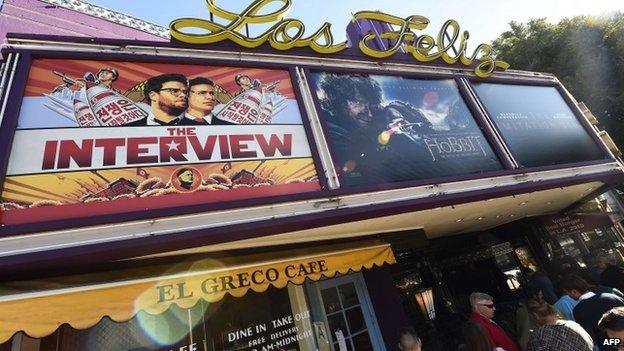
Cinemas in the US showed the film despite threats from North Korea
"The Interview is an illegal, dishonest and reactionary movie quite contrary to the UN Charter which regards respect for sovereignty, non-interference in internal affairs and protection of human rights as a legal keynote and international laws (sic)".
The North Korean leadership may be right: the film may yet become an interference in the internal affairs of their country. If it gets to be seen there surreptitiously, secret sniggering may change minds.
Insult v satire
It seems likely that copies of the film will get into North Korea, probably from China where it is reported that there have already been thousands of downloads - even though it's not supposed to be available.
The reaction in China seems to have been favourable from ordinary people and unfavourable from the people at the top.
According to the New York Times, The Interview got a very high score on a Chinese film appreciation website, with more than 10,000 people posting reviews.
On the other hand, one of the papers run by the Communist Party said the film represented "senseless cultural arrogance."
A similar split in opinion might be expected as banned copies reach North Korea.

Reactionary was one of the gentler adjectives used by North Korea to describe the film, starring Seth Rogan (centre)
And might it yet be nominated for an Oscar? If it were, could it pick up support in a contest for the Best Film award? It's not too hard to imagine how this parody of Kim Jong-un could continue to torment the regime in Pyongyang (which, you'll remember, first drew attention to the film).
The latest statement from the North Korean leadership ends with a threat: "If the US persists in American-style, arrogant, high-handed and gangster-like arbitrary practices, despite the repeated warnings of the DPRK (North Korea), the US should bear in mind that its failed political affairs will face inescapable deadly blows".
This is an echo of King Lear's threat: "I will do such things. What they are yet I know not, but they shall be the terrors of the earth!"
In the Shakespearean play, the unspecific threat is the raving of an impotent man. That isn't quite true of Kim Jong-un. He is developing nuclear weapons and the rockets to deliver them, initially to countries around, particularly South Korea and Japan.
But North Korea is not yet believed to have made a nuclear bomb small enough to carry on a rocket.
North Korea also has skilled cyber-warriors who have attacked the computer systems of banks and TV stations in South Korea, and perhaps the system of Sony Pictures (there are several authoritative independent experts who have doubts).
The leadership in North Korea denies it was behind the Sony attack, but applauds it. It also asserts that it is the United States that brought down what passes for the internet in North Korea.
In the meantime, it's now a war of hot words. From Pyongyang: racism and insult - the monkey remark and calling the US gangsters. From Hollywood: a lively farce given weight by sharp political barbs.
The British satirist Peter Cook once said that the power of satire was over-rated. On being asked about the effect of the Berlin cabaret artists of the 1930s, he replied: "Yeah, they really showed Hitler, didn't they?"
The Interview is not going to topple Kim Jong-un - but it might one day help. And it has annoyed his regime.
Crude insult or satire. Which is more effective?
- Published25 December 2014
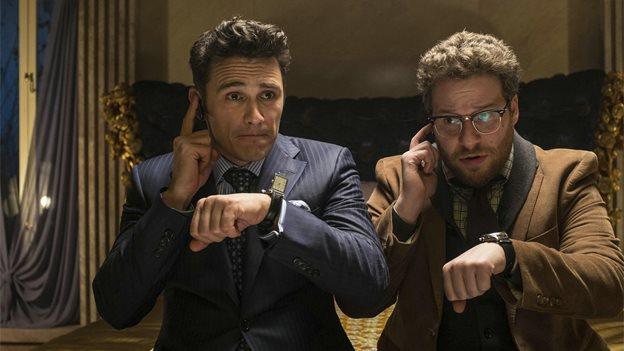
- Published23 December 2014
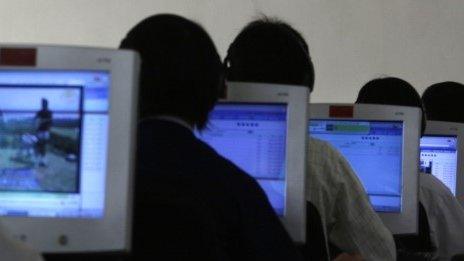
- Published23 December 2014
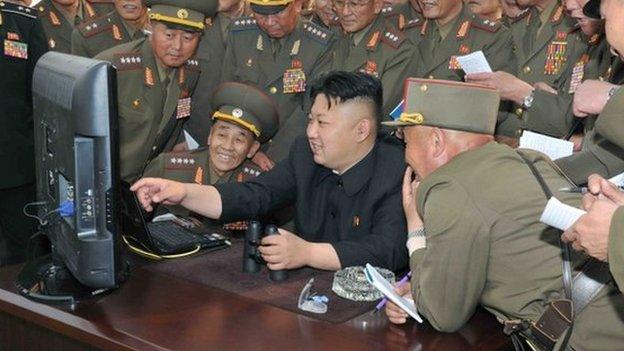
- Published19 December 2014

- Published19 December 2014
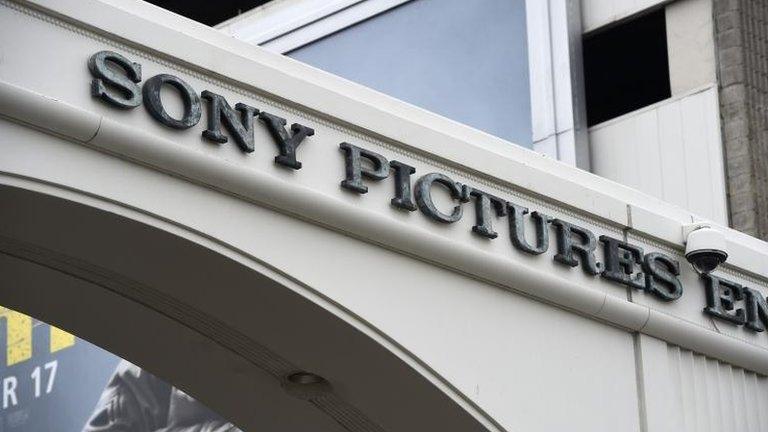
- Published23 December 2014
